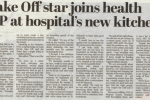January 2019
First of all, I would like to pay tribute to the tireless work that our doctors and nurses perform, not least of all the role of those doctors and nurses who have come from overseas to provide us all with our world-leading National Health Service.
I completely understand concerns regarding the impact of our withdrawal from the European Union on foreign nationals working in the NHS. I know from being on the board of the hospital trust they are constantly running recruitment drives, especially in the Neurology and Dermatology departments where Chichester has shortages. They have also taken on 12 nursing apprentices to bring in more staff and help people start a career in health. That is why I welcome the Government's repeated commitment that all EU nationals working in the UK will be able to remain in the country with the same rights as they enjoy today.
EU citizens are an important part of the economic, cultural and social fabric of our country and their rights needed to be secured. A new settled status scheme under UK law will be introduced for EU citizens and their family members, covered by the Withdrawal Agreement. This will ensure that EU nationals can continue to perform their vital roles across a range of sectors, in particular, the health and care sector.
The latest NHS workforce statistics show that far from the referendum result encouraging EU nationals working in the NHS to leave our country, there are over 4,300 more EU nationals working in the NHS than there were in June 2016. I would also note that the proportion of our NHS workforce made up by EU nationals has risen to 5.6 per cent, up from 3.1 per cent in 2010.
Since 2011, Tier 2, the main immigration work route for skilled non-EEA workers have been subject to an annual cap of 20,700 places, divided into monthly allocations. The cap was based on advice from the independent Migration Advisory Committee (MAC) and is one of the Government's key strategies for managing net migration. It operates by controlling the number of places allocated to UK-based employers who are seeking to recruit a migrant worker where no suitable resident worker can be found.
As you may be aware, the limit has been oversubscribed since December 2017, and it is clear that this cap is having an impact on the health sector as well as other sectors of the economy.
It is therefore extremely welcome that all doctors and nurses have been exempt from the Tier 2 cap since July 2018. This means that doctors and nurses can be sponsored without putting pressure on the entire immigration system.
The MAC has also been commissioned independently to review the full composition of the Shortage Occupation List. I look forward to reading the recommendation made by the MAC when they report by the Spring of next year.



